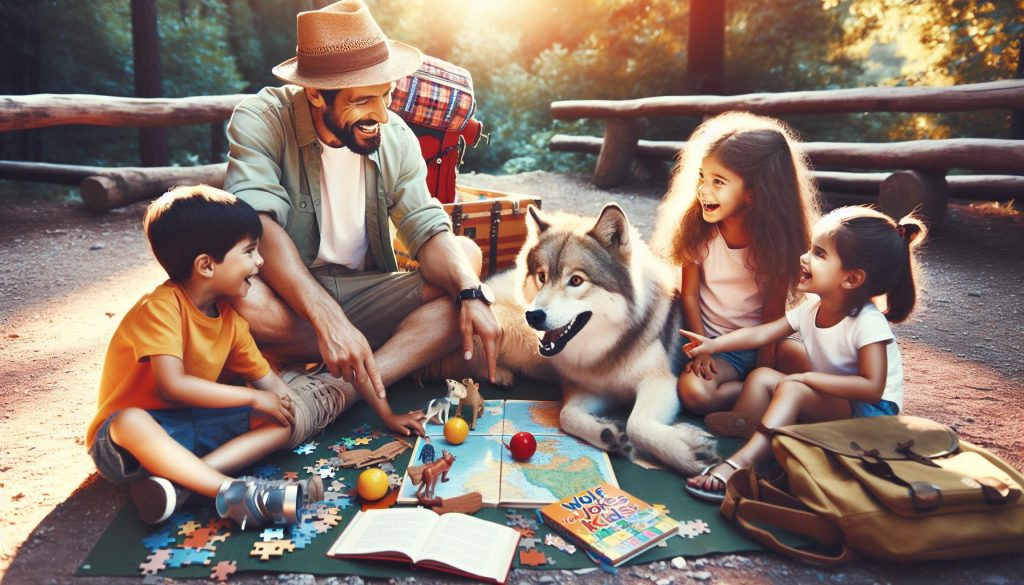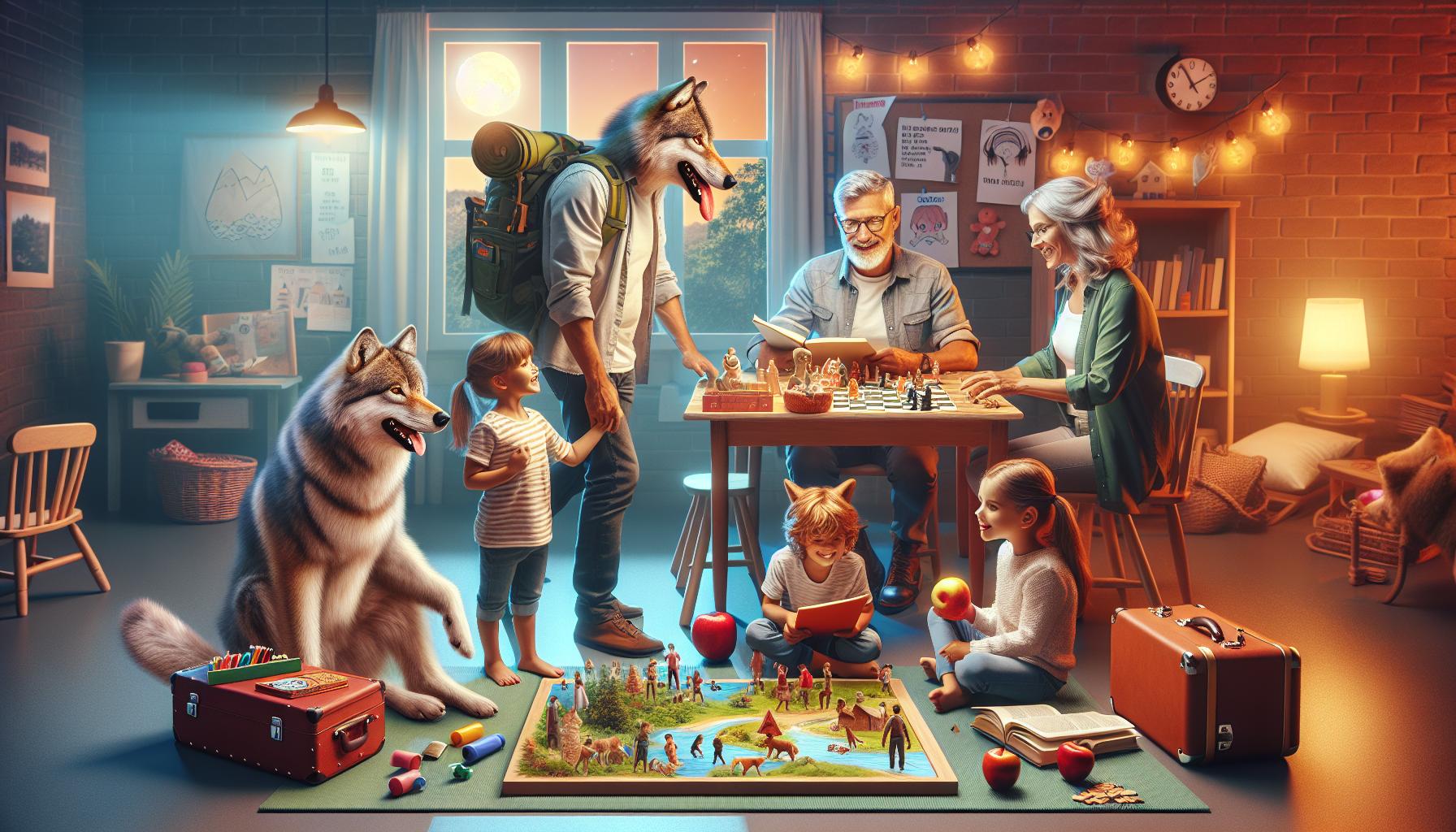Wolf Jokes for Kids: Howlingly Funny for Every Little Storyteller
Are you ready to unleash a howl of laughter? Dive into our collection of “Wolf Jokes for Kids: Howlingly Funny for Every Little Storyteller,” where giggles await around every corner. Whether your child is a budding comedian or just loves a good chuckle, these playful puns and witty one-liners are sure to tickle their funny bone and spark their imagination. Perfect for sharing with friends, family, or even the classroom, this article is packed with jokes that will have kids of all ages laughing out loud. So, grab your notepad and prepare to howl with delight—as storytelling has never been this much fun!
Understanding the Appeal of Wolf Jokes in Children’s Humor
Children are naturally drawn to animals, and wolves, with their mysterious allure and captivating characteristics, hold a special place in storytelling and humor. The appeal of wolf jokes lies in their ability to blend fun with elements of nature and folklore. These jokes ofen introduce kids to concepts of cleverness, friendship, and the importance of understanding both the light and dark sides of nature, all wrapped in a humorous package. Here are some key reasons why wolf jokes resonate so well with young audiences:
- Relatability: Children can easily relate to the themes of friendship and adventure seen in wolf tales, making the humor accessible and enjoyable.
- Imagination: Wolves have a strong presence in various tales and folklore, allowing children to use their imaginations to create amusing scenarios and characters.
- Learning Opportunities: Through humor, kids can learn about wolves’ roles in nature, fostering discussions about wildlife and conservation in a light-hearted manner.
Additionally, wolf jokes often involve puns and wordplay, making them not just funny but also educational. Wordplay engages critical thinking as children consider multiple meanings and contexts. Teachers and parents can springboard from these jokes to encourage creativity and storytelling. For example, a simple joke about a wolf could lead to a fun narrative-building exercise, where kids invent their own wolf-related stories or jokes.
such humor can be enhanced by incorporating visual elements. As an example, using illustrations of amiable or silly wolves alongside the jokes can amplify understanding and laughter. Humor can also serve as a social bridge, helping shy kids connect with others through shared laughter. Here’s a quick way to demonstrate how wolf jokes work:
| Joke | Explanation |
|---|---|
| Why was the wolf always invited to parties? | As he was a howling good time! |
| what did the wolf say to his friend? | Let’s “paw-sitively” have some fun! |
Incorporating wolf jokes into playtime or lessons not only entertains but nurtures a child’s cognitive and social development. The howling laughter that ensues is just one more way to ensure that storytelling remains a joyful and impactful experience for every little storyteller.
The Benefits of Storytelling Through Jokes for Kids
Storytelling through jokes is a delightful way to engage children, as it combines humor with narrative, stimulating their imaginations and enhancing cognitive skills. When children hear a joke, they not only laugh but also follow a story arc that includes a setup, a twist, and a punchline. This structure encourages them to think critically about how stories work and to anticipate outcomes based on earlier clues. Here are some key benefits:
- language Development: jokes often play with words, rhymes, and puns, which can expand vocabulary and improve language skills in a fun and memorable way.
- Listening skills: When children listen to jokes, they learn to pay attention to details. Understanding the punchline often requires catching nuances in the setup.
- Emotional Intelligence: Humor helps children express emotions and understand social cues.Sharing jokes fosters interaction, teaching them about timing and audience response.
- Creative Thinking: Crafting their own jokes encourages kids to think outside the box,nurturing creativity and confidence in their storytelling abilities.
Additionally, jokes about relatable themes—like wolves—allow children to connect emotionally with the characters while appreciating the humor.Here’s a simple table showcasing some wolf-themed jokes along with the lessons they can teach:
| Joke | Lesson |
|---|---|
| What do you call a wolf that knows a secret? | Learning about discretion and keeping secrets. |
| Why did the wolf stop howling? | understanding that sometimes it’s okay to rest. |
| What did the wolf say to his friend? | Practicing friendship and interaction skills. |
By integrating humor into their storytelling, children can enjoy a multifaceted learning experience, enriching their understanding of narrative while having a great time. This fusion of laughter and learning can ultimately pave the way for lifelong skills in communication, creativity, and critical thinking.
Top Wolf Jokes to Spark Laughter and Imagination
Get ready for some howlingly funny jokes that will tickle the funny bones of every aspiring young storyteller! These wolf-themed jokes are perfect for sparking laughter and igniting the imagination. Here are some of our favorites that are sure to bring joy and giggles:
- Why did the wolf join a band? As he had the best howls!
- What do you call a wolf that knows how to dance? A wolf with moves!
- Why did the wolf sit on the clock? He wanted to be on time for dinner!
- What do you get when you cross a wolf and a dog? A howling good time!
These jokes aren’t just for laughs; they can be a great way to inspire creativity! Encourage kids to think of their own jokes or short stories about wolves. A little creativity can turn a simple joke into a whole thrilling adventure. Such as,they could write about a wolf who becomes a hero in the forest or a wolf who solves mysteries!
| Joke | Inspiration |
|---|---|
| Why do wolves love to tell stories? | Because they have great tales! |
| What do wolves wear when it’s cold? | Their fur-real jackets! |
Feel free to share these jokes in storytime,during family gatherings,or even as a fun icebreaker at school! Each one is a delightful twist on wolf lore,guaranteed to entertain and engage young minds. The world of wolves is vast—full of adventures waiting to be imagined, so let the storytelling begin!
How to Use Wolf Jokes to Enhance Language Skills
Integrating wolf jokes into language learning can transform the process into a fun and engaging experience for kids. These light-hearted quips not only tickle the funny bone but also provide a playful way to explore vocabulary, sentence structure, and storytelling skills. Here are some effective ways to harness the power of humor:
- vocabulary Building: Encourage children to identify keywords from the jokes. For example, in the joke “What did the wolf say to the sheep? ‘Let’s make this a por-tion controlled meal!'”, discuss the meanings of words like “portion” and “controlled.” This reinforces understanding through entertaining context.
- Creative Storytelling: Use the punchlines of wolf jokes as prompts for creative writing. Ask kids to imagine a scenario where the joke takes place or to create a new joke. For instance, after sharing “Why did the wolf always carry a pencil? Because he wanted to draw his pack!”, challenge them to write a short story about a wolf artist.
- Discussion Skills: organize group discussions around the themes present in the jokes. Questions like “What do you think about wolves and their portrayal in stories?” or “Can you think of other animals that are misunderstood?” can be great conversation starters, promoting critical thinking and articulation.
Consider using a simple chart to track the vocabulary explored in the jokes:
| Word | Definition | Use in a Sentence |
|---|---|---|
| Howl | A long, loud, mournful cry of a wolf. | The wolf began to howl as the moon rose. |
| Prowl | To move around stealthily. | The wolf would prowl through the forest quietly. |
| Pack | A group of wolves. | The wolf felt safe by staying close to his pack. |
Utilizing humor, especially with wolf jokes, opens up pathways for children to engage with the language in a multifaceted way. By merging laughter with learning,kids not only enhance their language skills but also develop a deeper appreciation for storytelling and communication.
Integrating Wolf jokes into Educational Activities
Incorporating wolf jokes into educational activities offers a playful way to engage children while enhancing their learning experience. By weaving humor into lessons, educators can make complex topics more approachable and enjoyable. Here are a few creative ideas on how to do this:
- Storytelling Sessions: Start each storytelling session with a wolf joke to capture attention and lighten the mood. Such as,after telling a story about a wolf,you might ask,”What did the wolf say after reading the story? Howl about a plot twist!”
- Writing Prompts: Use wolf jokes as writing prompts. Encourage kids to create their own original jokes involving wolves or other animals, which helps develop their creativity and writing skills. Suggest they craft a short story around their joke.
- Interactive Games: Introduce fun guessing games where children have to match jokes to their punchlines. This can reinforce comprehension and listening skills while integrating laughter into the classroom atmosphere.
- Art Projects: Encourage kids to illustrate their favourite wolf jokes.This not only allows for artistic expression but also brings a visual element to humor that reinforces memory retention.
To further support these activities, consider creating a humorous “Wolf Joke Wall” in your classroom where students can display their jokes and artistic interpretations. This fosters a sense of community and encourages students to appreciate each other’s creativity.
| Activity | Learning Outcomes |
|---|---|
| Storytelling with Jokes | Enhanced listening skills, creativity |
| Writing Prompts | Improved writing skills, critical thinking |
| Interactive Games | Boosted teamwork, communication |
| Art Projects | Creativity, expression through art |
Encouraging Creativity: Crafting Original Wolf Jokes
Encouraging creativity in children can be as simple and enjoyable as crafting jokes together. When it comes to wolf jokes, the playful nature of these furry creatures lends itself to a variety of humorous contexts. Here are some tips to inspire your little storytellers:
- Utilize Wolf Characteristics: Wolves are known for their howling, pack behavior, and cleverness. encourage kids to think about these traits when coming up with punchlines.
- Play with Puns: Puns can make for some of the silliest jokes. Words like “paws,” “howl,” and “fur” can lead to some clever wordplay.
- Incorporate Story Elements: Turning everyday situations into wolf-themed scenarios can spark laughter. Ask kids how a wolf might handle the most mundane tasks.
- get Inspired by nature: Encouraging children to observe wolves in their natural environment or through stories can help them come up with relatable and funny situations.
To put these ideas into action, here’s a small table of examples that can spark creativity:
| Setting | Setup | Punchline |
|---|---|---|
| Forest | Why did the wolf bring a ladder? | To reach the howling high notes! |
| Campfire | What did the wolf say at the campfire? | “I’m just here for the s’mores and howls!” |
| School | Why did the wolf get a good grade? | because he knew how to “wolf” down his homework! |
By engaging your children in the process of crafting wolf jokes, you not only enhance their creativity but also promote their understanding of humor and storytelling. They can enjoy sharing their howlingly funny creations with friends and family, spreading joy and laughter along the way!
Wolf Jokes as a Tool for Building Social connections Among Kids
In the delightful world of childhood, humor acts as a powerful bridge connecting little hearts and minds. Wolf jokes, with their playful twists and howling punchlines, serve as a fantastic tool for fostering relationships among kids. sharing a laugh over a clever joke not only lightens the mood but also breaks down social barriers, encouraging shy kids to engage in conversation and enabling them to form new friendships effortlessly.
When children tell each other wolf jokes, they experience:
- Shared Laughter: The spontaneous giggles that accompany a well-timed punchline create a bond between the joke teller and the audience, reinforcing their social ties.
- Confidence Building: Crafting and delivering jokes helps kids develop their communication skills while boosting their self-esteem as they receive positive reactions from peers.
- Empathy and Understanding: kids learn to appreciate different senses of humor, which fosters respect for diverse personality types within their social circles.
| Wolf Joke | Social Skill Developed |
|---|---|
| Why did the wolf cross the road? To prove that he wasn’t chicken! | Encouraging playful banter |
| What do you call a wolf who loves to play hide-and-seek? A “howl” seeker! | Building anticipation and suspense |
| What do you get when you cross a wolf and a superhero? Wolf-man,the howler! | Creative thinking and storytelling |
This lively exchange of jokes also cultivates a rich storytelling culture among kids. As they narrate their favorite wolf tales, they not only enhance their narrative skills but also learn the fundamental aspects of listening and responding. The interaction spurs collaboration, as groups may find themselves creating original wolf jokes together, blending imagination with social connection. In this way, the humble wolf joke becomes much more than just a source of entertainment—it transforms into a shared experience that enhances social skills and builds lasting friendships.
FAQ
What makes wolf jokes suitable for kids?
Wolf jokes are particularly suitable for kids because they blend humor with the wonder of nature, sparking imagination while also promoting laughter. Children naturally gravitate towards animals, and wolves, with their fascinating behaviors and mythological presence, stir interest in storytelling. By using humor related to wolves, kids can find a playful way to engage with an animal that is often depicted in fairy tales and folklore.
For instance, jokes that play on the characteristics of wolves – such as their howling or pack mentality – offer laughable twists that resonate with children’s experiences and their understanding of the world.Additionally, humor develops a sense of community and bonding among peers, fostering a supportive environment where kids can share and laugh together.This interactive shared experience can stimulate their social skills, as they learn to take turns in storytelling and joke-telling.
How can telling wolf jokes enhance children’s storytelling skills?
Telling wolf jokes can substantially enhance children’s storytelling skills by encouraging them to experiment with narrative structure and delivery. When children learn jokes, they engage in elements like timing, expression, and exaggeration—all key components of effective storytelling. this playful engagement helps them understand the cadence and rhythm of language, making their own stories more engaging and lively.
Moreover, as children tell wolf jokes, they frequently enough adapt or create their versions, which nurtures their creativity and encourages imaginative thinking. For example, a standard joke about a wolf might prompt a child to invent a longer story about why the wolf in question decided to howl or what happened after the punchline. This progression from a single joke to a larger narrative is an excellent way for kids to develop storytelling skills while having fun.
Are wolf jokes beneficial for educational purposes?
Absolutely! Wolf jokes can be a valuable educational tool when integrated into learning environments.Not only do they captivate children’s interest, but they also offer various opportunities to teach about wildlife, ecosystems, and conservation. As a notable example, while sharing a joke about a wolf, educators can segue into discussions about the wolf’s habitat, their role in nature, and ongoing conservation efforts to protect these creatures.
In addition,humor in education serves to lower barriers to learning and promote a positive atmosphere.Studies show that laughter enhances brain function, improves memory retention, and increases motivation—all crucial components in effective learning. With wolf jokes, teachers can create a casually engaging environment bursting with both laughter and learning, effectively utilizing humor to capture children’s attention on a range of related subjects.
What themes do wolf jokes typically explore?
Wolf jokes often explore themes that revolve around the animals’ characteristics, cultural meaning, and natural behaviors. Common themes include howling—which is a significant aspect of wolf communication—loyalty (as wolves are known for their pack mentality), and myths surrounding wolves in various cultures. These themes not only keep the jokes entertaining but also serve as a bridge to discussing broader topics related to wildlife.
Such as, a classic joke about why the wolf is howling can lead to exploring why animals communicate vocally in the wild. Similarly, jokes about wolves being misunderstood can be a launchpad for discussing stereotypes in both human and animal behavior. This approach not only entertains but also educates children about empathy towards living beings and promotes understanding of different perspectives.
How can parents and educators use wolf jokes to foster conversations about nature?
Parents and educators can effectively leverage wolf jokes as a springboard for conversations about nature and wildlife conservation. When kids hear a funny joke about a wolf, it can pique their interest and inspire them to ask questions, leading to deeper discussions about the importance of biodiversity and animal habitats. this type of inquiry aligns perfectly with scientific literacy goals and encourages curiosity.
One engaging method is to create interactive storytelling sessions where kids not only tell jokes but also discuss what they’ve learned about wolves afterward. Such as,after sharing a joke about a wolf’s stealthiness,an adult can engage children in a conversation about how wolves hunt and survive in their environment. This not only reinforces the party atmosphere while telling jokes but also makes learning enjoyable and memorable.
Where can I find more wolf jokes for kids?
If you’re looking for more wolf jokes to share with kids, there are several resources available that cater specifically to humor aimed at younger audiences. Online platforms, such as children’s comedy websites and educational blogs, often compile lists of kid-friendly jokes, including countless wolf-themed ones. Additionally, children’s books containing animal jokes or stories are widely available at libraries and bookstores.
Parents can also encourage kids to create their own jokes, sparking creativity and critical thinking. By engaging in activities such as joke workshops or storytelling circles, children can learn from each other and build upon existing themes or punchlines. Involving kids in the process of finding or creating these jokes not only makes the experience more personalized but also deepens their appreciation for humor and storytelling.
The Conclusion
As we wrap up our exploration of “Wolf Jokes for Kids: Howlingly Funny for Every Little Storyteller,” we hope you’ve discovered just how valuable humor can be in fostering creativity and engagement in young minds. With a treasure trove of jokes that cater to their love for storytelling and a whimsical take on nature, these howlingly funny quips not only lighten the mood but also encourage children to explore their imaginations.
Remember, laughter is a global language, and providing kids with delightful jokes can enhance their social skills, build resilience, and boost their confidence. We encourage you to share these jokes with the children in your life,sparking their interest in storytelling while creating cherished moments of laughter. Whether it’s during storytime, playdates, or simply around the dinner table, these wolf jokes are sure to raise smiles and giggles. So go ahead—let the laughter howl, and watch as young storytellers thrive!




